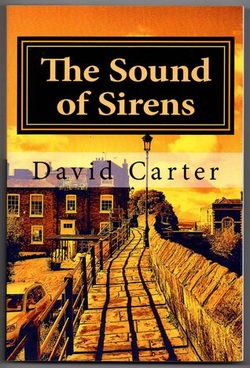
* * * *
The author provided me with a copy of The Sound of Sirens in exchange for my fair and honest review.
I must say that I had some difficulty in determining how to “rate” this read in terms of stars. The story moves along and was well thought through, but I had one issue with it that I just couldn’t let go. Specifically, that was the author’s common use of incomplete sentences, which made the reading a bit difficult for me.
There seems to be a current trend, a fad almost, to write in a style I find somewhat akin to (for lack of a better description) “stream of consciousness.” I know the traditional description of this form means that the writing itself is often just a stream of words, likely even lacking punctuation—which is not the case here. But, I find the author’s style similar in that the work draws the reader to follow the narrator’s “thoughts.” This style does work—particularly for a story told from a single perspective and in first person. It gets the reader right into the action, allowing him (or her) to follow along with the character’s internal musings. It can even set a mood, which I must admit, it did do in the opening scene of The Sound of Sirens. Even so, I find the style a bit . . . frustrating, as I long for the complete sentence. Further, this style, on occasion, shifted the scene in The Sound of Sirens rather suddenly from one viewpoint to another.
All that said, I did not find myself floundering around, trying to determine what was happening, as is often the case when things are written in cryptic little spasms. (Consider: “Moonless night, dry too, a hint of June balminess in the air.” “Pulled back into the shop doorway, took a drag on the fag.” “Didn’t speak.” “Took out the handgun.” “Gleamed in the moonlight.” These are just a few examples and they all come from the first page/scene of this read.) As I said, I always knew what was happening. I just found my reading halted at every semi-sentence. It is as though there is a little signal in my head somewhere that flashes “Error! Error!” whenever I read things in this style. I guess I’m old school . . . (longing, as I said, for the complete sentence). Having said that, I repeat: the author never left me wondering what was happening.
The Sound of Sirens is a story that includes a vast array of well drawn characters, including Walter Darritreau, the lead investigator; Luke Flowers, a contract killer; Gerry Swaythling, a wealthy man whose son had been Luke Flowers’s intended hit; Langley Wells, a loan shark; and many more. The cast included both heroes and villains, all of which were well drawn. The characters were varied and interesting. I also appreciated the manner in which Carter spoke of a murder that some might dub an “honor killing.”
I did find Inspector Walter Darritreau’s resolution of the case a bit odd in that he used information theretofore unknown to the reader—or at least to this reader. (Did I miss something?). Had some of the details been scattered about throughout the story at earlier times, Darritreau’s summation would have been even more fulfilling for me, as I would either have surmised some of the details myself, or I would have chastised myself for having missed them! Thus, in some ways, the summation seemed a bit too convenient.
All in all, The Sound of Sirens engaged me. I rooted for the good guys and was rightfully irritated by the bad guys. For me, one good way to determine how to “rate” a work is to consider whether I would read more by this author. When considering the story in that light, I would have to say that I most definitely would read more from David Carter. Thus, I have attached to this read, a four-star rating.
Also posted on GoodReads, BookLikes and Amazon.com, added to two review groups on Google+ and to my Facebook page, tweeted and cover pinned.
The author provided me with a copy of The Sound of Sirens in exchange for my fair and honest review.
I must say that I had some difficulty in determining how to “rate” this read in terms of stars. The story moves along and was well thought through, but I had one issue with it that I just couldn’t let go. Specifically, that was the author’s common use of incomplete sentences, which made the reading a bit difficult for me.
There seems to be a current trend, a fad almost, to write in a style I find somewhat akin to (for lack of a better description) “stream of consciousness.” I know the traditional description of this form means that the writing itself is often just a stream of words, likely even lacking punctuation—which is not the case here. But, I find the author’s style similar in that the work draws the reader to follow the narrator’s “thoughts.” This style does work—particularly for a story told from a single perspective and in first person. It gets the reader right into the action, allowing him (or her) to follow along with the character’s internal musings. It can even set a mood, which I must admit, it did do in the opening scene of The Sound of Sirens. Even so, I find the style a bit . . . frustrating, as I long for the complete sentence. Further, this style, on occasion, shifted the scene in The Sound of Sirens rather suddenly from one viewpoint to another.
All that said, I did not find myself floundering around, trying to determine what was happening, as is often the case when things are written in cryptic little spasms. (Consider: “Moonless night, dry too, a hint of June balminess in the air.” “Pulled back into the shop doorway, took a drag on the fag.” “Didn’t speak.” “Took out the handgun.” “Gleamed in the moonlight.” These are just a few examples and they all come from the first page/scene of this read.) As I said, I always knew what was happening. I just found my reading halted at every semi-sentence. It is as though there is a little signal in my head somewhere that flashes “Error! Error!” whenever I read things in this style. I guess I’m old school . . . (longing, as I said, for the complete sentence). Having said that, I repeat: the author never left me wondering what was happening.
The Sound of Sirens is a story that includes a vast array of well drawn characters, including Walter Darritreau, the lead investigator; Luke Flowers, a contract killer; Gerry Swaythling, a wealthy man whose son had been Luke Flowers’s intended hit; Langley Wells, a loan shark; and many more. The cast included both heroes and villains, all of which were well drawn. The characters were varied and interesting. I also appreciated the manner in which Carter spoke of a murder that some might dub an “honor killing.”
I did find Inspector Walter Darritreau’s resolution of the case a bit odd in that he used information theretofore unknown to the reader—or at least to this reader. (Did I miss something?). Had some of the details been scattered about throughout the story at earlier times, Darritreau’s summation would have been even more fulfilling for me, as I would either have surmised some of the details myself, or I would have chastised myself for having missed them! Thus, in some ways, the summation seemed a bit too convenient.
All in all, The Sound of Sirens engaged me. I rooted for the good guys and was rightfully irritated by the bad guys. For me, one good way to determine how to “rate” a work is to consider whether I would read more by this author. When considering the story in that light, I would have to say that I most definitely would read more from David Carter. Thus, I have attached to this read, a four-star rating.
Also posted on GoodReads, BookLikes and Amazon.com, added to two review groups on Google+ and to my Facebook page, tweeted and cover pinned.


